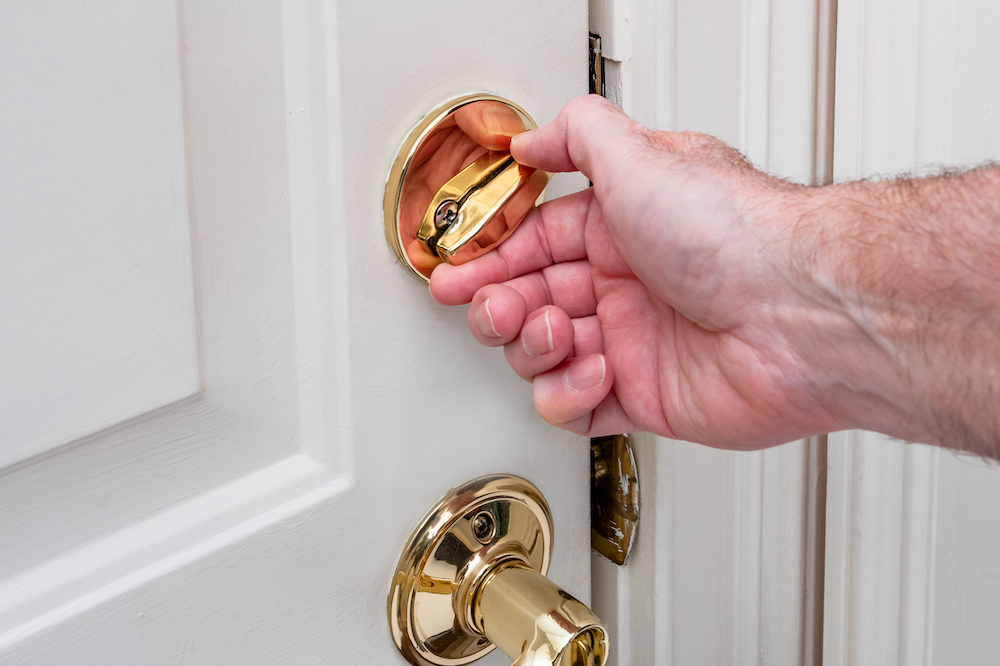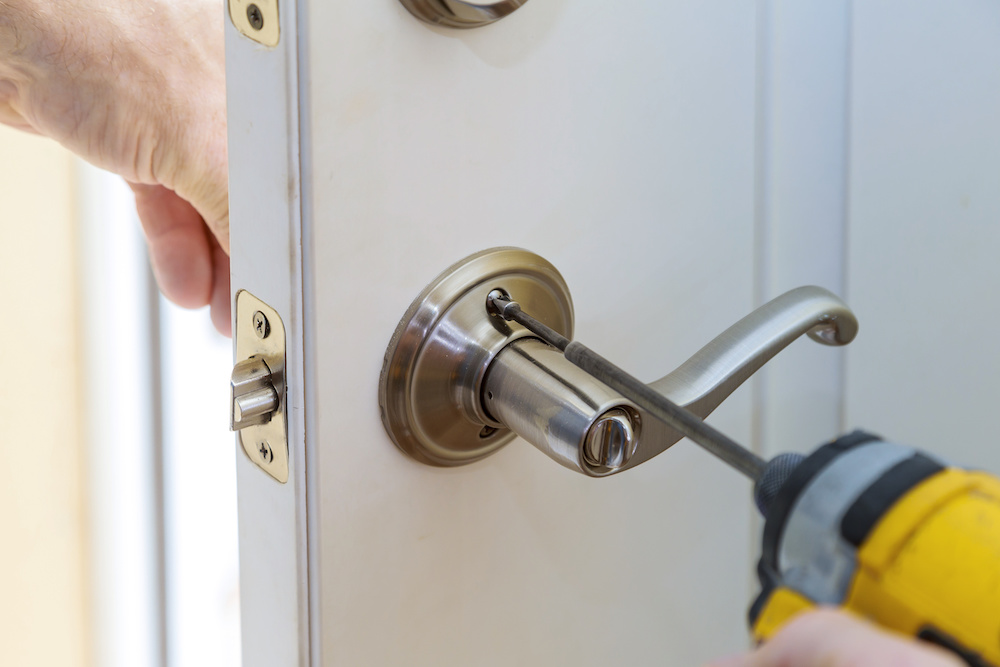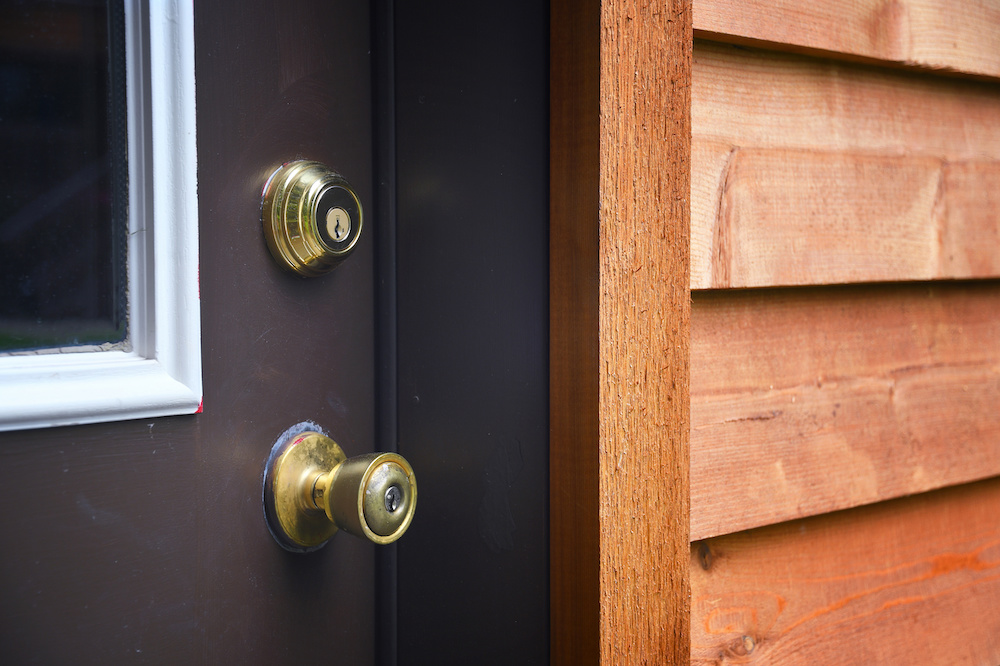The single vs double cylinder deadbolt debate has often sparked controversy among builders and new property owners.
However, the best way to choose the right deadbolt is by identifying its usage and requirement.
For instance, single-cylinder deadbolts are the most common choice for residential purposes, while double-cylinder deadbolts are best in industrial settings.
Nonetheless, you must make a calculated decision when choosing between these two types of deadbolts.
Let’s go over the benefits of both single and double cylinder deadbolts and how to choose the right one for your property.
Is a Single Cylinder Deadbolt Good?
We found that single-cylinder deadbolts are the most common type of deadbolt locking mechanism used in households.
Perhaps that is because these locks are primarily responsible for extrapolating security measures by ensuring practicality, efficiency, and convenience.
For instance, the thumb turn or turnkey inside allows fast locking, while preventing users from getting locked in or out without a key.
You will also find that single-cylinder deadbolts are considerably cheaper than their affluent double-cylinder deadbolt counterparts.
We have also put together a list of advantages of installing single-cylinder deadbolt locks in high traffic spaces such as residential abodes.
The most common benefits of installing single-cylinder deadbolt locks are:
Easy Installation
Most brands of single-cylinder deadbolts advertise easy installation with the packaging because these are some of the most common locks available.
Still, we found that there are multiple factors to consider when installing this lock.
For starters, it is essential to consider how handy you are with such do-it-yourself projects.
If you have installed such locks before, you are definitely in luck, but there is always a manual for guidance if you have not.
Secondly, you should identify the number of locks you will need to install and their type.
If you will install several locks from the same brand, it will not take you much time or effort.
On the other hand, if you’ll install multiple single-cylinder deadbolt locks from varying brands, you may need to acquaint yourself with individual installation requirements.
Economical
Unlike double cylinder deadbolt locks, you will find single-cylinder deadbolts considerably cheaper and easily available in most hardware stores.
We found that this is mostly associated with the growing demand and increased supply of these locks.
Efficient Locking System
The most attractive feature of a single-cylinder deadbolt is its thumb-turning locking mechanism on one side.
It ensures convenience and reduces locking time which would otherwise increase with keys that may not always be available easily.
User-Friendly Utility
You will find that single-cylinder deadbolts can be operated by essentially anyone from adults to even children.
While this may be a point of concern for parents, it is also comforting to know that there is always an easy escape route.
That is especially applicable in the case of an emergency like a fire.
Are Double Cylinder Deadbolts Safe?
Double cylinder deadbolts are considered the safest type of deadbolt locking mechanism because these locks require a key on both sides to unlock or lock the door or window.
In doing so, you can keep your children and elderly with dementia and other ailments protected from the outside world.
That said, you will find that these locks are not very commonly used in all access areas in residential spaces and may be used in combination.
Some exits require fast access, such as front doors, as well as enhanced security when going on vacation.
In this case, users often use the single deadbolt lock regularly and the double-cylinder deadbolt when going away on short or long trips.
Similarly, these locks are most suitable for commercial usage or areas in residential spaces with less foot traffic, such as glass windows and doors.
That is usually because even if the glass gets broken, the intruders will not gain access without a key.
Additionally, we found that ANSI graded 1 double-cylinder deadbolt locks are bump proof while those graded 2 are pick proof.
That means double cylinder deadbolt locks are the safest and most secure way of protecting homes and office spaces.
Other Security Benefits of Double Cylinder Deadbolts
There are multiple security-related advantages of getting double cylinder deadbolt locks:
- The locking mechanism is housed within the door’s structure, so it can not be shattered or broken into.
- Shimming attacks are practically useless because the deadbolt is fully extended within the door’s frame and strike plate.
- Deadbolts are significantly longer than knob lock latches, which means intruders can’t spread the door to gain access.
- Double cylinder deadbolt doors can not be kicked in if there is a properly installed strike plate.
Are Double Key Deadbolts Illegal?
One of the downsides of investing in double key deadbolts is that they can potentially be illegal in some states and cities.
Therefore, we recommend double-checking the local codes for your property before purchasing double cylinder deadbolt locks.
The most common reason for prohibiting these locks is that they are not in line with common fire code restrictions.
Since you can’t use double key deadbolts without keys, there is a chance that people can become trapped in buildings and houses during emergencies.
If you are unsure about your area’s legal requirements regarding double key deadbolts, we recommend hiring a professional locksmith.
A certified locksmith will know about the local codes and guide you regarding the exits that benefit most from these locks.
Nonetheless, as a general rule of thumb, we recommend installing double cylinder deadbolts in properties with a plan for emergencies already in place.
This way, you will not only mitigate panic but also prevent any casualties during emergencies.
Are Two Deadbolts Better Than One?
Some people believe that there are increased benefits of installing two deadbolts rather than one.
That said, installing more than one deadbolt in some cases may not make sense.
The Benefits
Let’s explore some advantages of installing two deadbolts.
Enhanced Security
The most obvious benefit of installing two deadbolts is enhanced security levels.
That is especially true if your property is in an area with a comparably high crime rate.
Having two locks can substantially increase the time it will take an intruder to pick or break the locks.
However, this is only possible if the windows on your property are properly secured already and the locks used are of high quality.
Reduced Insurance Premiums
You will find that having two deadbolts is often an essential requirement of insurance companies.
Perhaps because having more than one lock also shows commitment to security, thereby making your insurance claim significantly more reliable and payable.
We also found that having two deadbolt locks instead of one helps reduce insurance premiums.
Mitigate Emergency Risks
There are many safety concerns associated with only installing a double cylinder deadbolt lock.
Combining a double cylinder deadbolt with a single-cylinder deadbolt means a significant reduction in emergency risks.
Perhaps that is because users can easily escape the premises with a single deadbolt, which is the preferred lock for day-to-day usage.

Considerations
Although two deadbolts will theoretically make your property safer, there are two main practical factors to consider during installation
Size of the Exit Point or Door
Professionals assert that unless the door’s size is larger than usual, having two deadbolts will not make a substantial difference.
Still, we found that having more than one deadbolt on a regular door can increase your security level by at least ten percent.
That is only possible in the case where the deadbolts are installed at a distance from one another.
Location of the Exit Point or Door
Adding multiple deadbolts to all the doors on the premise can be costly and extremely troublesome.
Therefore, we propose that installing more than one deadbolt should be limited to essential exits and compromised windows or doors with glass.
These exit points are also potential access points for intruders, so you must consult with a professional locksmith to make a sound judgment call.
Can You Kick Down a Door With a Deadbolt?
Forceful entry is a common way for intruders and burglars to gain access to different properties.
That said, you will find that there are some ways to help reduce their chances of getting in and compromising your security.
We found that doors with deadbolt locking mechanisms have a higher chance of withstanding forced entry, especially when kicked down.
While double cylinder deadbolt locks ensure higher levels of security, you will find that single cylinder deadbolts are not entirely purposeless in this capacity.
Although deadbolts are difficult to kick down, it is not completely impossible.
The Factors
Two factors can help mitigate the risk of kicking down a door with a deadbolt lock:
The Door’s Strength
The deadbolt’s credibility increases significantly if installed in a sturdy door.
That means that doors made with high-quality wood and are of considerable thickness will help prevent break-ins.
As a general rule of thumb, we recommend using solid core or metal insulated doors for primary exits such as front doors, side doors, and garages.
These are not only heavier but also extremely robust and specifically made to withstand forced entries.
On the other hand, you must use hollow core doors for privacy purposes within residential or industrial properties.
These doors are made with thin veneer material and have a hollow center, reducing overall weight.
They are also extremely lightweight and will easily break upon the first attempt and forced entry or if kicked in.
The Quality of the Lock
The quality of the lock installed goes a long way in determining your door’s sturdiness and ability to withstand a break-in.
The best way to identify a high-quality lock is by checking the rating given by the American National Standards Institute (ANSI).
The three ANSI ratings determine the overall sturdiness and performance of the deadbolt locks.
Thus, it can be a great guide when choosing a suitable deadbolt lock for commercial and residential usage.
Increasing the number of deadbolts on your exit points will only be beneficial if the right-grade locks are installed.
Here is an overview of the American National Standards Institute (ANSI) deadbolt grading system that helps identify deadbolts based on pre-set standards:
- Grade 1
Grade 1 deadbolts are essentially deemed most secure by ANSI and therefore most commonly used in commercial or industrial settings.
Grade one deadbolts tend to be considerably more expensive than their counterparts, so they’re not usually the first choice of homeowners.
Still, houses located in dangerous neighborhoods are often recommended to install grade one deadbolts for enhanced security.
Also, deadbolt locks that receive this highest level of grading have gone through one million opening and closing tests to establish their validity.
The latches in these deadbolts are also an inch long and will not come undone even after ten individual attempts of forced entry.
That is only possible if the force employed does not increase by 75 pounds in each attempt.
- Grade 2
Grade two-level deadbolts offer a happy medium when choosing between the three grades of locks.
They offer a similar security level as grade one locks, but at a mid-price range, so they are often the first choice for homeowners.
Their commercial-grade security level also makes them an excellent choice for mid-tier industrial settings.
To achieve this grading, these locks have gone through extensive 800,000 opening and closing tests to establish their reliability.
While their latch measures at ⅝ of an inch, they can only withstand five blows of forced entry, each worth 75 pounds of equal force.
- Grade 3
If you want to install a secondary level security measure or locks on non-essential doors within properties, then grade three locks are well suited.
These locks have the lowest resistance capacity against forced entry and can easily be overpowered.
In terms of technicalities, these have a latch bolt measuring ⅝ of an inch.
They can also only hold up to two strikes of forced entries at 75 pounds of brute force each.
Single vs Double Cylinder Deadbolt: Which Is Better?
You will find that the single vs double cylinder deadbolt debate can be broken down into two primary features: location and property type.
That means understanding the mechanisms of both deadbolts will help you evaluate them against your usage, and therefore easily identify the right one.
Fortunately, you do not have to choose one over the other as both types of deadbolts can be essentially installed in any given property.



